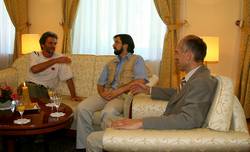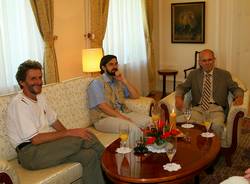 Office of the President of the Republic > Press centre
Office of the President of the Republic > Press centre
Dr. Janez Drnovšek welcomes Tomo Križnar
Ljubljana, 09/05/2006 | press release, statement

The President of the Republic of Slovenia Dr. Janez Drnovšek welcomed Tomo Križnar in the presidential palace after his landing at the Brnik Airport in Slovenia at 11.30 this morning. President Drnovšek also answered some questions posed by the journalists:
How do you feel, Mr. President?
Dr. Janez Drnovšek: I am pleased that Tomo Križnar is with us now. To be honest, I am also a bit relieved. This “saving from the prison” mission was not simple but it all turned out all right in the end and I am glad that they are both here, Tomo Križnar and Hamdija Blekić, who played a very important role in all this and made sure that we followed the right path and pulled the right strings.

Mr. President, you have been rather quiet lately. You said in one of your messages that they want to accuse you of gathering extra political credits in Slovenia. Who did you have in mind saying that you were responsible for Mr. Križnar’s situation?
Dr. Janez Drnovšek: I thought a lot has been written about that already? I have not read much about it but I heard that they have been writing a lot about the recent developments and the fact that I was responsible for Tomo Križnar’s situation. I believe Tomo went there as a volunteer, on a humanitarian mission. Both he and I, as well as all others involved in this project, only wanted, and we still want, to help the people in Darfur resolve this situation in the best possible way. This was our only motive.
And what do you have to say to these political disputes?
Dr. Janez Drnovšek: The intrigues in Slovenia were completely unnecessary and irrelevant and I am not interested in them at all. In the end, it only matters that Tomo is here and that the rescue operation was successful, and I am not at all interested in any rivalry for the merits and similar problems. I believe that you can easily establish an opinion about the situation by looking at who said what in the last month. I said nothing, I focused on activities and tried to resolve the matter in a suitable way and I am glad that it is over.
It is nonetheless important to know whether the rescue mission was successful because of your political incentive, your letter to the President of Sudan…
Dr. Janez Drnovšek: No, I do not think this is important at all. The only thing that matters is the fact that Tomo is here and that the mission was successful.
The fact is that it was thanks to the President of Sudan, who is not really popular in the world right now, that Tomo Križnar was pardoned. How will this affect the relationships between Slovenia and Sudan?
Dr. Janez Drnovšek: The President of Sudan is a sovereign president of this country and it was in his power to pardon Tomo Križnar. So I addressed my plea to pardon Tomo to him. And he did it. This is also the reason stated in the Pardon Act. I therefore believe that his action was very positive, constructive and it can do nothing but good for the relationships between the two countries and otherwise. Besides that, it gives us the possibility to try and continue with our activities aimed at resolving the situation in Darfur.
Will both of you go to Sudan next time?
Dr. Janez Drnovšek: The activities are not over yet. It is important to resolve the situation in Darfur. It does not matter who goes where; the only thing that matters that the appropriate measures are adopted. We have been regularly monitoring the local situation in Sudan and have maintained contact with the, let us say, key players. I believe the time for further steps to be taken will come soon.
What do you have to say in respect of the statements made by the Minister of Foreign Affairs Dimitrij Rupel who said that the release of Tomo Križnar happened upon the proposal of the foreign minister of Sudan? Do you also agree with such critiques, namely, that the Ministry of Foreign Affairs did not react soon enough in sending a person over there and that this person’s rank was not high enough?
Dr. Janez Drnovšek: This is none of my concern, I do not worry about such things and in fact, I am not interested in them at all. I was only hoping that others (by saying something inappropriate out loud) would not jeopardise our activities which were discrete, as we believed this was the right way to proceed in this case. Excessive external pressures, loud pressures, could stimulate the Sudan side to react exactly in the opposite way, to set a barrier and to prevent the pardon. This could happen if they felt that the international community wishes to make them do something, like they were a kind of a banana republic that can be “corrected” from the outside, instead of asking them, like any other sovereign country.
I just have one more question, if you do not mind. Have you, in these later days or weeks, in any way communicated with the Prime Minister Janša concerning the activities connected with the rescue of Mr. Križnar. Have you talked to each other? Have you been in contact?
Dr. Janez Drnovšek: No, we have not. We did not have to. The activities were conducted in a correct way. We are not in a very friendly relationship at the moment and I did not think it appropriate to adopt any special actions. Nevertheless, we did all we believed was necessary and nothing more than that. In my opinion it is reasonable to do what needs to be done and nothing more. If you do more than is necessary, the effect might not be the one you wanted to achieve.
Mr. President, can you tell us anything about the letter you sent to the President of Sudan?
Dr. Janez Drnovšek: I wrote, and explained, many things in that letter, namely, that Tomo Križnar was my messenger there and that we wanted to resolve the problem in Darfur for humanitarian reasons and that it just happened that he left from Chad to Darfur without a visa, for which I apologised in my letter. The fact was that their sovereignty had to be considered. We should not look down on them as if we could do whatever we wanted to. This was a special case because Darfur is a conflict area at the moment. We all know this and there is no real state border there. The refugees and the rebels are using it to cross from one side to the other. The flow of people never ends there and it is therefore no real border that a person with appropriate documents could cross; nor is there any control set up. It is a war zone.
Do you plan to insist on your initiative? Can you announce your next move already?
Dr. Janez Drnovšek: I will not tell about our next move because of the required discretion, which is especially important at the moment. When we started resolving the situation in Darfur, we had to wake up the international community, which is why we were somewhat louder. Also in the foreign mass media, because we wanted them to pay some attention to Darfur again. I believe that the time has come to upgrade the Abuja Agreement signed in May. That means the agreement between the government and one of the rebellious groups but not the others. This agreement is one step forward, but it is not enough. The situation in Darfur is constantly deteriorating, since now the rebellious groups also fight each other as well the government forces and the others. The dimensions of the humanitarian catastrophe are immense. Several humanitarian workers have died or have been killed there recently. The situation is indeed serious, and getting worse. This is why the Abuja Agreement has to be upgraded. If we can help, we will do it with great pleasure and enthusiasm. In my letter to the President Al-Bashir I also underlined my willingness and readiness to help resolve the situation in Darfur also in the future.
Mr. President, if you look back, what do you think – would it be better if Mr. Križnar had a status of a diplomat; would things be less complicated in such case?
Dr. Janez Drnovšek: I guess he will tell you this himself. Of course I believe it is good to have things arranged appropriately but as I said, this was a specific situation, a rather extraordinary one. I believe Tomo decided himself to go there, first to Chad and then from Chad to Darfur, because this is where he wanted to be, where the problem is and where he can help. I am sure many complications could be avoided if all the formalities were appropriately arranged, and things would be much better. But as I always say: all is well that ends well.
In the end, Tomo Križnar also answered a question (this is only a summary):
Who knows what the story would be like if I had a diplomatic passport. Where I was, no one knows what a diplomatic passport is. They just grab you, push you against the wall and want to cut off your “things that make you a man”. Their values are very different from ours. The situation there is extreme. ... We must find a way to resolve the crisis in Darfur. I am convinced that the Slovene initiative is a way to achieve that. And I sincerely hope you will continue, notwithstanding the series of unfortunate events that happened to me while I was there. I only see the positive intentions now. We gained new experience, new knowledge.